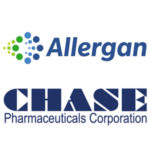 Allergan (NYSE:AGN) said today that it acquired Chase Pharmaceuticals for an upfront payment of $125 million, expanding the Dublin-based company’s neurological portfolio.
Allergan (NYSE:AGN) said today that it acquired Chase Pharmaceuticals for an upfront payment of $125 million, expanding the Dublin-based company’s neurological portfolio.
Washington, D.C.-based Chase is developing a combination therapy of an acetylcholinesterase inhibitor and a cholinergic blocker in the hopes of improving cognition in patients with Alzheimer’s disease. The acetylcholinesterase inhibitors available on the market are limited to small doses because of the side effects, which include diarrhea, nausea and vomiting. Chase touted results from phase II clinical trials, where 88% of patients reached the maximum allowable dose without experiencing dose-limiting adverse events.
The company held an end of phase II meeting with the FDA and Allergan said it intends to advance the combination therapy into a phase III registration study next year.
According to the agreement, Allergan will pay additional regulatory and sales milestones payments related to Chase’s lead candidate and other backup compounds.
“Alzheimer’s disease is a neurodegenerative disease that represents a major and growing global public health problem, for which very few approved treatment options are available, and the societal cost is measured in hundreds of billions of dollars, so the need for improved treatment choices is paramount,” Allergan’s chief R&D officer David Nicholson said in prepared remarks. “This acquisition adds a new Phase 3 ready program for Alzheimer’s disease to our CNS portfolio and builds on our commitment to develop innovative approaches to improve the lives of millions of patients suffering from this devastating illness.”
“We at Chase Pharmaceuticals are passionate about developing and bringing to physicians and their patients profoundly improved Alzheimer’s disease treatments,” Chase president & CEO Douglas Ingram added. ” I am very excited that Allergan has recognized the strong clinical value of our development programs and look forward to seeing Allergan apply its leading clinical development and regulatory expertise to bring these potential treatments forward for patients.”
“We believe our lead candidate, CPC-201, will offer a significant improvement over existing therapy in the symptomatic treatment of Alzheimer’s disease, and will benefit all those suffering from this disease,” Chase co-founder & chief scientific officer Thomas Chase said.
“When determining appropriate treatment for my patients with Alzheimer’s, I am looking for treatments that provide a beneficial effect with the lowest possible side effect profile,” Dr. Jeffrey Cummings, director of the Cleveland Clinic’s Lou Ruvo Center for Brain Health and a former consultant for Chase, explained. “The potential to provide improved cognition without the dose-limiting side effects of currently available [acetylcholinesterase inhibitors] would be a welcome advance for medical professionals, their patients and caregivers who seek better approaches to manage the symptoms of Alzheimer’s disease.”

